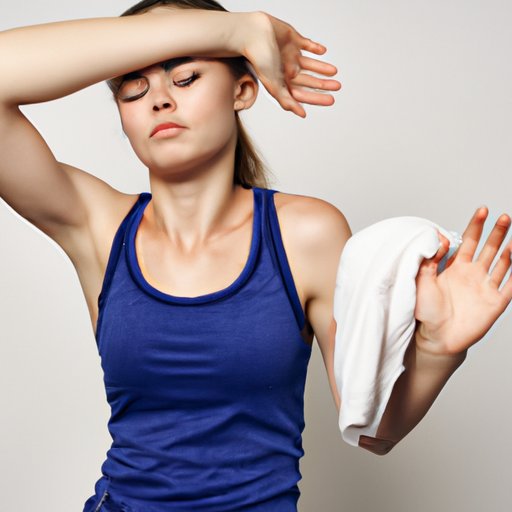Introduction
Sweating is a normal bodily function that helps us regulate our body temperature. However, some people experience excessive sweating, which can be embarrassing and uncomfortable. Excessive sweating, or hyperhidrosis, is defined as sweating beyond what is necessary to maintain normal body temperature.
Avoid Caffeinated Beverages
Caffeine is known to cause an increase in sweating. According to a study published in the International Journal of Neuroscience, caffeine increases sweat production in certain areas of the body. To reduce sweating, it is best to avoid caffeinated beverages such as coffee, tea, energy drinks, and sodas.
To cut back on your caffeine intake, try swapping out caffeinated beverages for herbal teas or water. You can also opt for decaffeinated versions of your favorite drinks. Additionally, limit your intake of chocolate and other foods that contain caffeine.
Wear Breathable Fabrics
When it comes to reducing sweating, the type of fabric you wear matters. Choose breathable fabrics such as cotton, linen, and silk that allow air to circulate and moisture to evaporate. Avoid synthetic fabrics such as polyester and nylon, which trap sweat and heat.
In addition to helping keep you cool, wearing breathable fabrics can help prevent bacterial growth that causes body odor. Make sure to launder your clothes regularly to prevent bacteria from building up on them.
Change Your Diet
What you eat can affect how much you sweat. Foods that are high in sugar, fat, and spice can increase your body temperature and lead to increased sweating. Try avoiding these types of foods and instead focus on eating fresh fruits and vegetables, lean proteins, and whole grains.
Foods that are high in potassium, such as bananas, potatoes, and avocados, can help reduce sweating. Additionally, drinking plenty of water throughout the day can help keep your body temperature regulated.
Practice Relaxation Techniques
Stress and anxiety can cause an increase in sweating. To reduce stress and anxiety levels, practice relaxation techniques such as deep breathing, mindfulness meditation, and guided imagery. Take time each day to relax and focus on your breathing.
Relaxation techniques can help reduce sweating by calming the mind and body. They can also help reduce muscle tension, which can lead to increased sweating.
Try Antiperspirant/Deodorant Products
Over-the-counter antiperspirants and deodorants can help reduce sweating. Look for products that contain aluminum chloride, which is a common ingredient in antiperspirants. This ingredient helps block the sweat glands to reduce sweating.
For best results, apply antiperspirant/deodorant products at night before bed. This gives the product time to absorb into the skin and be more effective. Additionally, reapply during the day if needed.
Consider Botox Treatments
If over-the-counter products don’t work, you may want to consider Botox treatments. Botox is a neurotoxin that temporarily blocks the nerves that activate the sweat glands. The result is a decrease in sweating.
Botox treatments typically last between six and nine months. The effects will gradually wear off over time, so repeat treatments are necessary to maintain results. Talk to your doctor about whether Botox treatments are right for you.
See a Doctor
If you are still having trouble controlling your sweating, it’s important to see a doctor. A dermatologist or primary care physician can help diagnose the cause of your excessive sweating and recommend treatments. During your appointment, be sure to ask questions about how to reduce sweating.
Your doctor may recommend lifestyle changes, topical medications, or even surgery. Depending on the severity of your symptoms, they may also refer you to a specialist for further evaluation.
Conclusion
Excessive sweating can be embarrassing and uncomfortable. Fortunately, there are several ways to reduce sweating, including avoiding caffeine, wearing breathable fabrics, changing your diet, practicing relaxation techniques, using antiperspirant/deodorant products, and considering Botox treatments. If your sweating persists, be sure to talk to your doctor.
(Note: Is this article not meeting your expectations? Do you have knowledge or insights to share? Unlock new opportunities and expand your reach by joining our authors team. Click Registration to join us and share your expertise with our readers.)
